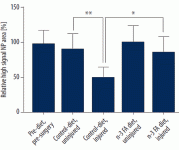Fish oil for lower back pain?
Fish oil supplementation protects the intervertebral discs against damage. This is suggested by an animal study that researchers from Cedars-Sinai Medical Center published in the Medical Science Monitor. If the intervertebral discs are damaged due to physical causes - for example due to a training injury - fish oil reduces the amount of cartilage that disappears in the intervertebral discs. Or should we say: does fish oil accelerate the recovery of the intervertebral discs?
Study
The researchers damaged the intervertebral discs of rats [Injured] with a surgical procedure. After two months, they determined by MRI scans to what extent the disks had recovered.
During these two months, half of the rats received omega-3 fatty acids daily. The researchers used OmegaRx 2 Liquid Fish Oil from Zone Labs. [zonediet.com] This consists of EPA and DHA (2:1).
The other half of the rats received no active substances.
Results
According to the scans, the amount of nucleus pulposus [NP] in the damaged intervertebral discs was greater in the rats that had received omega-3 fatty acids. The nucleus pulposus is the elastic and resilient inside of intervertebral discs.
Mechanism
The researchers do not know exactly how omega-3 fatty acids limit the damage to intervertebral discs. Perhaps the fatty acids inhibit inflammation, they speculate. The researchers base this suspicion on the shift in the arachidonic acid: EPA ratio in blood of the test animals that received fish oil.
Arachidonic acid is a metabolite of omega-6 fatty acids. The body body uses arachidonic acid as a raw material for inflammatory factors. The shift suggests that EPA displaces arachidonic acid, thereby reducing the production of inflammatory factors.
Conclusion
"This study suggests that n-3 fatty acids dietary supplementation might have potential protective effects on the progression or spinal disc degeneration", write the researchers. "Daily oral supplementation with 530 mg/kg/day or pharmaceutical grade n-3 fatty acids for 2 months decreased AA/EPA ratios in blood serum, and reduced signs of intervertebral disc degeneration degeneration."
"Further research is needed to evaluate the effect of n-3 fatty acids on disc degeneration in large cohorts with different degrees of disc degeneration."
"Furthermore, n-3 fatty acids dosing needs to be optimized," the researchers conclude.
If the rats were adult humans, they would have received 4-6 grams of fish oil daily. That is on the high side. The European Food Safety Agency EFSA thinks that people can consume up to 5 grams of fish oil with DHA and EPA every day. [EFSA Journal 2012;10(7):2815.] It could just be that the optimum dose of fish oil for humans is considerably lower than 4-6 grams per day.
Source: Med Sci Monit. 2019;25:9531-7.
Fish oil supplementation protects the intervertebral discs against damage. This is suggested by an animal study that researchers from Cedars-Sinai Medical Center published in the Medical Science Monitor. If the intervertebral discs are damaged due to physical causes - for example due to a training injury - fish oil reduces the amount of cartilage that disappears in the intervertebral discs. Or should we say: does fish oil accelerate the recovery of the intervertebral discs?
Study
The researchers damaged the intervertebral discs of rats [Injured] with a surgical procedure. After two months, they determined by MRI scans to what extent the disks had recovered.
During these two months, half of the rats received omega-3 fatty acids daily. The researchers used OmegaRx 2 Liquid Fish Oil from Zone Labs. [zonediet.com] This consists of EPA and DHA (2:1).
The other half of the rats received no active substances.
Results
According to the scans, the amount of nucleus pulposus [NP] in the damaged intervertebral discs was greater in the rats that had received omega-3 fatty acids. The nucleus pulposus is the elastic and resilient inside of intervertebral discs.
Mechanism
The researchers do not know exactly how omega-3 fatty acids limit the damage to intervertebral discs. Perhaps the fatty acids inhibit inflammation, they speculate. The researchers base this suspicion on the shift in the arachidonic acid: EPA ratio in blood of the test animals that received fish oil.
Arachidonic acid is a metabolite of omega-6 fatty acids. The body body uses arachidonic acid as a raw material for inflammatory factors. The shift suggests that EPA displaces arachidonic acid, thereby reducing the production of inflammatory factors.
Conclusion
"This study suggests that n-3 fatty acids dietary supplementation might have potential protective effects on the progression or spinal disc degeneration", write the researchers. "Daily oral supplementation with 530 mg/kg/day or pharmaceutical grade n-3 fatty acids for 2 months decreased AA/EPA ratios in blood serum, and reduced signs of intervertebral disc degeneration degeneration."
"Further research is needed to evaluate the effect of n-3 fatty acids on disc degeneration in large cohorts with different degrees of disc degeneration."
"Furthermore, n-3 fatty acids dosing needs to be optimized," the researchers conclude.
If the rats were adult humans, they would have received 4-6 grams of fish oil daily. That is on the high side. The European Food Safety Agency EFSA thinks that people can consume up to 5 grams of fish oil with DHA and EPA every day. [EFSA Journal 2012;10(7):2815.] It could just be that the optimum dose of fish oil for humans is considerably lower than 4-6 grams per day.
Source: Med Sci Monit. 2019;25:9531-7.


